Last week, Nick Cohen suggested that Lady Butler-Sloss was not the correct person to lead the child abuse enquiry. She has now resigned from her role.
The Guardian says today that Lady Butler-Sloss cannot be the right person to lead the inquiry into alleged child abuse.
‘Not only was her brother, Lord Havers, attorney general – and briefly lord chancellor – at the time of some of the allegations of cover-up. She is also of the same generation as those around whom rumours swirl. If she were still sitting as a judge, she would never contemplate being involved in a case that might touch, however remotely, on family or friends.’
Unfortunately, this isn’t true. I reported a few months ago on the case of Mr Justice Tugendhat and the former Tory party treasurer, Peter Cruddas, who sued the Sunday Times after it sent undercover reporters to interview him. The journalists pretended to be agents for foreign investors, who wanted to give money to the Tories, and covertly recorded as Cruddas talked.
The headline ‘Tory treasurer charges £250,000 to meet PM’ followed.
Tugendhat found the paper guilty of libel and malicious falsehood. It should not have said that Cruddas was a corrupt man, who offered opportunities to influence government policy and gain unfair advantage through meetings with ministers. It was also false, he continued, for the paper to allege that Cruddas accepted donations to the party knowing that the money was to come from abroad, in breach of UK electoral law. Tugendhat ordered the paper to pay £180,000 in damages – not least because the party leadership forced Cruddas out after the story broke.
Tugendhat did not, however, declare an interest, and invite the parties to request that he step down. He did not say that his brother, Christopher Tugendhat is a Conservative peer and former MP. Nor did he mention that his son Tom Tugendhat was searching for a Tory seat. Indeed, a few months after the trial, Conservatives in Tonbridge selected Tom to be their parliamentary candidate at the next election for one of the five safest Tory seats in the country.
The Sunday Times appealed. In November last year, Lady Justice Sharp’s refused to allow the application. The Sunday Times pressed on, and asked for a hearing. Just before it began, we published our piece about Tugendhat’s family connections.
Lady Sharp contacted the paper and said that it may want to know that, like Tugendhat, she also had a brother who was a prominent Conservative.
So she did. Richard Sharp is a former head of private equity for Goldman Sachs. He is on the board of a right-wing think tank, the Centre for Policy Studies. As Private Eye put it, the think tank ‘campaigns against a mansion tax for wealthy homeowners and in favour of zero-hours contracts for poor workers’.
Last year the Wall Street Journal estimated that his personal fortune was £90 million. Sharp has personally donated tens of thousands from it to the Tory Party and Tory politicians. In 2007, he moved from Goldman Sachs to be chairman of the lobbying and PR firm Huntsworth plc, which also donates to the Tory Party.
George Osborne appointed him to the Bank of England’s Financial Policy Committee in 2013.
Lady Sharp stood down. Several lawyers told me, it was because the Spectator had raised Tugendhat’s family connections. I have no idea if this is true.
Instead of going before Sharp, the Sunday Times‘s appeal was heard by Lord Justice Maurice Kay and Lord Justice Laws on 16 April this year. Laws said the Sunday Times, had to persuade the court that Tugendhat ‘went wrong on the facts to a radical degree. That is a tall order on any view, and it is right to note that the trial judge in this case [Tugendhat] has a wealth of experience in the field of defamation.’
For all that, Laws allowed the Sunday Times to appeal. He found the Cruddas case ‘unusual and in some ways troubling’. There were ‘some singular features’ about it.
Equally singular are the rules on when judges should stand down. The Court of Appeal said in 2006 that ‘if in any case there is real ground for doubt, that doubt should be resolved in favour of recusal’ but essentially left it the judge’s discretion. If there is one thing the child abuse and Sunday Times cases teach us, it is that the rules need to be made much clearer.
A basic one, it seems to me, is that if you have a family connection to a case, you cannot judge that case.






Comments
Comments will appear under your real name unless you enter a display name in your account area. Further information can be found in our terms of use.